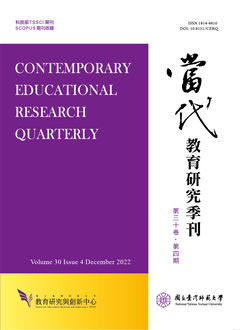

在此研究進行之前,國內外未曾有文化回應的檳榔防制教學研究。為了探究主流檳榔防制教育的難題,並發展回應檳榔栽種區文化的檳榔防制教學,本研究在行動研究的循環歷程中,傾聽檳榔栽種區小學三、四年級學童的生活經驗與受教經驗、進行田野工作,並促成了兒童社區劇場、巡迴演出及社區耆老座談。學校教育應是提升學童文化資本、促成學童階級向上流動的途徑,然而,主流檳榔防制教育較為單面向地傳輸健康風險與污名化的論述,可能使學童在食用檳榔前多一層阻嚇力,卻不足以讓學童在豐富的生活經驗中解套。研究發現,檳榔栽種區低家庭資本的學童,易受環境與同儕示範影響而陷入「身不由己」的兒童貧窮處境;然而,家長的身教言教有助於學童擁有說出「我長大不會嚼檳榔」的自信。此外,忽視學童文化差異易造成學童的學習阻礙,否認學童家庭社會資本也易使學童產生異化感。本研究結合並反思主流檳榔防制教材,回應學童文化的教學行動包括:在理解與陪伴中提昇學童學校文化資本以間接帶動學童家庭文化資本,以及,善用同儕力量,肯認並提升學童家庭社會資本等。
To date, there has been no literature published concerning theapplication of culturally responsive teaching to prevention of arecanut chewing. In order to examine the obstacles to the mainstreampreventive education and pioneer culturally responsive teaching onareca nut chewing, the researcher of this paper attempted, throughrepeated action research, to record the individual and educationalexperiences with third and fourth graders on areca nut plantations,conduct the fieldwork, establish the applied theater and tour thetheatrical company, and organize gatherings of elderly people in localcommunities and schools.School education is meant to augmentschool-age children’s cultural capital and to be the way that increasessocial mobility. However, the fact that current areca nut preventiveeducation is limited to the threat to health and stigmatization maywell act as a deterrent to schoolchildren before they chew it. It is notsufficient to release them from addiction in real life. The researchfound that the impoverished children in areca nut plantations arepotentially subject to environmental and peer influence, and becomeinvoluntary addicts. The parental teaching by words and by examplesmay develop schoolchildren’s confidence to say “I won’t chew arecanut when I grow up.” Furthermore, disregard of the children'scultural diversity may cause an impediment to their learningbehaviors, and denial of their family social capital can stimulate asense of alienation from schooling. To conclude, this researchre-examines the mainstream preventive education on areca nutchewing, and further introduces culturally responsive teaching, whichis intended to raise school's cultural capital along with school-agechildren's family cultural capital, providing shared understanding andconstant companionship, and develop the strong capacity of the peergroup to recognize and to that end to increase children's family socialcapital.

本著作係採用創用 CC 姓名標示-非商業性 3.0 台灣 授權條款授權.
本刊國立台灣師範大學教育研究與創新中心
106台北市和平東路一段162號 | 電話: 02-7749-3670 | E-mail: cerecerq@gmail.com
教創中心 | 師大 | 電子報 | 線上投審系統
本刊由國家科學及技術委員會人文社會科學研究中心補助經費
© 2014 CERI-NTNU
